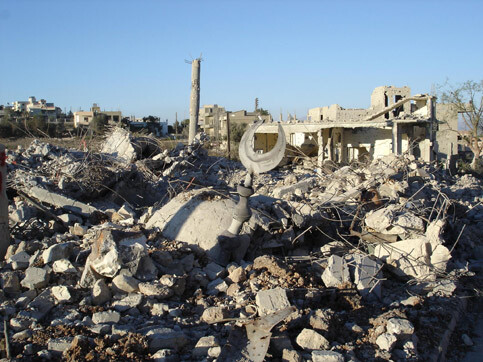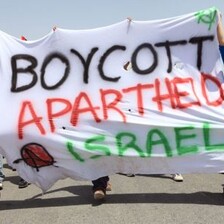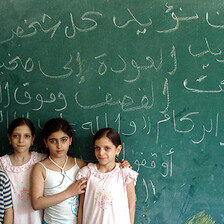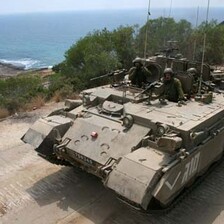Electronic Lebanon 2 September 2006

A mosque destroyed by Israeli fire (Sami Hermez)
The recent Israeli war on Lebanon, which culminated on August 14th in a ceasefire and the passing of UN resolution 1701, has exposed Israel to political and military defeat. While the UN resolution does not address the real issues to bring about justice, the war itself has allowed Hizballah to appear stronger today than it did at the start of Israel’s military offensive. Contrary to mainstream belief, Israel’s aggression began long before Hizballah’s capture of two Israeli soldiers this summer. Israel has frequently abducted Lebanese militants and civilians, contributing to the nearly 9,000 prisoners languishing in Israeli prisons. Efforts by Israel to raise the Lebanese people against themselves in the hopes of creating another fratricide 16 years after the end of the civil war, have also failed.
However, now that there is a ceasefire there have been calls to disarm Hizballah immediately, and discussions and arguments raised among Lebanese have turned into more serious internal rifts. Many people insist on denouncing both Israel and Hizballah, but are focusing more on their dislike of Hizballah and on its disarmament.
There is a critical need today to address the concerns of many Lebanese who are unsure of how to stand their ground and of what moral positions to take. Our argument is that Lebanese (and the people of the Arab world) should take a principled stand against Israel’s policies, as it continues to justify its use of unparalleled, broad-scale military aggression. The Lebanese people should concertedly support a national Lebanese resistance as proof of their sovereignty, independence, and rejection to subjugation and oppression. For our position to be clear, we must assert that the Syrian regime, or any other regime that claims to speak in the interest of the Lebanese people, is not to be relied upon as a fundamental part of the solution. The solution begins with the Lebanese people and extends to those of other nations who are willing partners in arms and struggle, as well as in peaceful economic and cultural exchanges. Resistance to Israel will also undoubtedly create better relations among Lebanese and Syrians, as well as in the region in general. Unity during resistance is not only crucial for the rebuilding of a strong Lebanon, but for affirming that its sovereignty is respected by its neighbors, just as the Lebanese people must respect the sovereignty of others.
In a recent speech, Sayed Hassan Nassrallah addressed the Lebanese saying that in order to build a strong Lebanon — a strong nation — the Lebanese must bolster their unity and resistance. They must begin by embracing the reality that they, as a nation, are under attack, and it is only their unity and solidarity that can effectively deter outside aggression. The first step is to refute the idea that Hizballah provided a pretext for Israel to begin its bombardment.
The logic of needing a pretext is one we buy from the American and Israeli media and their governments’ propaganda. It is a colonial logic that precedes this decade, and wants us to believe that Israel needed a pretext to launch its attack on a much weaker country; just as it would have us believe that the United States needed a pretext to attack Iraq. Israel will always sell its wars as “defensive” measures; the success of this rationale testifies to that of modern imperialist propaganda, as manifested in staunch alliances like that between the United States and Israel. This was the case in 1982, when the pretext for the Israeli attack on Lebanon was the attempted assassination of the Israeli ambassador to England. Again, however, the reality dates back to a much deeper history; one of decades of occupation by Israel of Lebanon, as well as of occupied Palestine and other Arab economies at large. Attacks on Israel have been a form of retaliation and self-defense against Israel’s colonial endeavors, and they find their roots in the need among Arabs to possess rightful sovereignty over their land and resources. Of course, this runs contrary to the a-historical view that attacks on Israel are born out of a vacuum. Were it not for Israel’s colonial designs in Palestine and the region, and its ideological vision of ethnic segregation, Arabs would have no reason for militancy. The crux of the problem rests in the Western view that Arab sovereignty is alone a pretext for Israeli invasion. As Arabs, we are told forcefully, time and time again, that we must understand this and surrender to it.
The fact is, as the Christian Science Monitor puts it:
“Since its withdrawal of occupation forces from southern Lebanon in May 2000, Israel has violated the United Nations-monitored “blue line” on an almost daily basis, according to UN reports. Hizballah’s military doctrine, articulated in the early 1990s, states that it will fire Katyusha rockets into Israel only in response to Israeli attacks on Lebanese civilians or Hizbullah’s leadership; this indeed has been the pattern.Israel’s need for a pretext is a myth. It has been training and preparing for this war for sometime now - well before UN resolution 1559 took full force. With superior intelligence and world opinion on its side, there is little else Israel needs to do to create the veneer of self defense.In the process of its violations, Israel has terrorized the general population, destroyed private property, and killed numerous civilians. This past February, for instance, 15-year-old shepherd Yusuf Rahil was killed by unprovoked Israeli cross-border fire as he tended his flock in southern Lebanon. Israel has assassinated its enemies in the streets of Lebanese cities and continues to occupy Lebanon’s Shebaa Farms area, while refusing to hand over the maps of mine fields that continue to kill and cripple civilians in southern Lebanon more than six years after the war supposedly ended. What peace did Hizbullah shatter?”[1]
At this point we should turn to the critics who say, “Why is Hizballah armed in the first place? Why did it turn Lebanon into a battleground? Why doesn’t it just work diplomatically after it disarms to free the tiny piece of land and three prisoners?”
Hizballah is armed because Israel has insisted on using violent tactics including bombardment and occupation against the Lebanese and other Arab peoples for over five decades. Lebanon has repeatedly been used as a battlefield upon which Israel carries out its aggressions, be they against Palestinian residents who make up 10 percent of the Lebanese population, or against other elements in Lebanon which Israel perceives as threatening to its sovereignty. Diplomatic solutions have not benefited the Arab people throughout the history of the modern Middle East, because diplomacy has increasingly grown into an exclusive tool for superpowers - none of which place the autonomy of the Arab people as a priority over their own interests. Similarly, diplomatic shortcomings during this war have failed to halt Israeli massacres of Lebanese civilians; such diplomatic shortcomings not only include the inaction of international governmental institutions and their inability to restrain Israel from trespassing Lebanese sovereignty, but more importantly include documents such as resolution 1701, which is only a recipe for a temporary cease to hostilities in order for both sides to rearm and re-strategize. Ceasefires of this nature, which are authorized by governmental bodies that service the interests of stronger states, in fact prolong the historical hostility expressed by Israel against Lebanon and several of its other Arab neighbors. Resolution 1701 does not affirm a categorical refusal of Israeli aggression against Lebanon, and consequentially, its acquiescence of Israeli’s offensive only justifies Israeli preemptive strikes without granting Lebanon the support or right to defend itself in return.

Destruction in Baalbek following Israeli bombing (Mayssoun Sukarieh)
Should Arab resistance to various forms of occupation simply cease because Arab forces are weaker? Let us take the prisoners that Hizballah is fighting for as one example: They are Lebanese prisoners that were captured in the name of Lebanese freedom. Do we just forget about them now because it has been over 20 years? Their release is overdue, and in fact, the duration of their captivity signifies the relentless tension that is the very source of mistrust and aggression with which Israel treats Lebanon and its Arab neighbors. Israel has received respect for the value it places on every Jewish life, and for its adamancy to return even the remains of its soldiers back to Israel for proper burials. Why not afford the same respect and value to Lebanese, Palestinian, or any other Arab lives?
As for our airspace, we cannot always pick and choose the ways in which we are sovereign. If the Lebanese wish to be a sovereign nation then it must be so in every aspect; the very system which America and Israel claim to promote is comprised of a set of rules that are meant to regulate an international system of sovereign states. It is the Lebanese people’s right to defend their place within this system. Is even the sovereignty of the Lebanese less valuable than Israelis’ or Americans’? Or does the lack of Lebanese sovereignty, and the resulting violence, allow stronger states such as the United States and Israel to capitalize on the Lebanese condition of chaos? If the Lebanese people are not going to fight for complete sovereignty then what dignity is left? How can it be expected that a whole people would forego such a claim? In short, there is no moral basis for Hizballah to disarm or give up its demands for land or prisoners, especially not after it has been politically and militarily victorious; there is no moral basis because diplomacy has failed for 58 years. It has failed because a hostile state supported by the world’s greatest power cannot accept the sovereignty of the Arab individual. How can we expect it to respect the existence of any Arab country?
In short, Hizballah is taking the correct moral position. In this it stands above all Arab governments and countries. It cannot be criticized from this angle — from the angle of resistance to foreign occupation. Not standing with Hizballah for these reasons puts the Lebanese people in a morally inferior position, and allows the stronger states — the aggressors — to control Lebanon’s fate by dividing it as a nation. Just because this moral stand puts Lebanon in the line of fire alone does not mean the Lebanese should stand with other Arab countries that gravely surrender. Just because Jordan and Egypt, amongst other Arab governments, have given in to the might of the US dollar and its militant Israeli executer, does not mean others should follow.
What the Lebanese people must do is begin to think of Hizballah as part of a greater Lebanese National Resistance, and inspire all sectors of Lebanon to instead capitalize on the Israeli aggression by accepting Lebanon’s diversity and uniting in resistance. Lebanon must remove the card of disunity from the hands of the enemy by joining this resistance in every way: culturally, academically, socially, economically, and just as important, militarily. This sort of resistance captures the meaning behind Nasrallah’s position: The Lebanese people need unity and resistance to build a strong nation.
To be with the Lebanese National Resistance does not mean all Lebanese should be with Hizballah in its Islamic ideology or worldview. Rather, it means that they are uniting in a coalition with their fellow Lebanese against a common enemy. Once they, as a resistance, are able to settle their external problems together, they have taken the first step toward realizing that any internal problems faced by the Lebanese are in fact manageable — if, in fact, Lebanese autonomy is achieved. In a democracy there will be hundreds of voices, and this is healthy. If the Lebanese people let Hizballah do all the fighting and not support a national resistance, which is the most moral position, then when all this is over Lebanon will be left with a failed state just as it began.
The Lebanese people must recognize the moral position. Perhaps we should quote a great, respected European philosopher for the world to relate to this position; Hegel once said: “[S]acrifice for the individuality of the state is the substantial relation of everyone and therefore a universal duty” and “in so far as the state as such and its independence are at risk, duty requires all citizens to rally to its defense”. He continues that “[t]he true valour of civilized nations is their readiness for sacrifice in the service of the state, so that the individual merely counts as one among many. Not personal courage but integration with the universal is the important factor here”.[2] Although Hegel speaks from the West, and although much of his historic writing did not accurately describe the condition of the former colonized people, his view embraces the language of the West, and in-so-doing, underlines the irony of any Western power that reserves the right to protect its own sovereignty while trespassing on that of others. The Lebanese people reserve the right to defend the moral position of self dignity vis-a-vis a fully recognized sovereignty.
This position today is the position Hizballah is taking. Once the Lebanese are able to understand the concept behind such a position, then sectarian ideology need no longer plague minds with fear and hold the people back from recognizing and resisting the essential enemy — the foreign occupier. What can be rejected are any hegemonic trappings in Hizballah’s ideology and conservative Islamic social agenda. This rejection does not mean Hizballah should disappear or be annihilated, in the same way that a rejection of the Lebanese Forces and its ideology does not mean it should be destroyed (otherwise the Muslims and Christians will always be pitted against each other in a war of existence, as they always say). The presence of Hizballah and other Lebanese groups is what makes Lebanon beautiful and ugly. Lebanon is a nation strewn with years of ethnic, sectarian and communalistic strife because it never had the chance to accept internal difference. A national resistance provides such a chance.
The Lebanese people should not reject Hizballah, as their arms protect the country’s sovereignty, dignity, and rights. Hizballah is not the reason Israel has attempted to destroy Lebanon. Israel has attacked Lebanon, and has been an aggressor against many other Arab peoples, because this is the only way it can survive. It has used violence against Lebanon because it wants the people as a subjugated neighbor with no power and no ability to take any moral stand. Israel, along with the United States, would like the Lebanese people, and other Arabs alike, to be followers and consumers while Israel makes no retribution for the crimes it has committed against them or against the other 10 percent of the Lebanese population — the Palestinians who reside in camps. This is aside from the fact that Israel has no designs to compensate for the crimes it has perpetrated against international laws in order to recreate a law that caters to its own interests.
The Lebanese can only go on like this temporarily. Businesspeople and the middle to upper classes may believe that there are no problems because they can benefit from the status quo. Yet such a status quo only provides short term prosperity for the few, and even those few have no guarantee that their gains will not be destroyed at any moment — in the same way as Lebanon’s growth was undercut and stunted in the span of a few days following July 12 of this year. Those at the upper echelons of society will need to be more compassionate, more in touch, and more altruistic toward communities that are out of sight; they should act more in the mind and heart and not in the pocket if they desire to build a strong, working, prosperous, independent, sovereign, and more importantly, moral and dignified Lebanon — a Lebanon that is in touch with itself. Hizballah is filling this gap today; the Lebanese should follow its lead if they wish to unite, break the chains of sectarianism and the monopoly of power by any one local group, and create an integrated nation that is critical for the future of the Lebanese people.
Sami Hermez is a Lebanese doctoral student of Anthropology at Princeton University currently writing from the South of Lebanon from the village of Deir Kifa where he is working on a Campaign for Civilian Resistance. He can be reached at shermez@princeton.edu
Noora Kassem is a masters student of International Politics at the University of London, where she has spent the last year researching the nature of US involvement in the modern Middle East. She can be reached at noorakassem@gmail.com
Related Links
Endnotes
[1] Strindberg, Anders. “Hizbullah’s attacks stem from Israeli incursions into Lebanon.” Christian Science Monitor. August 1, 2006.
[2] Hegel, G.W.F. Elements of the Philosophy of Right. Allen W. Wood, ed. H.B. Nisbet, trans. New York, NY: Cambridge UP. 1991 (p. 363-364).





